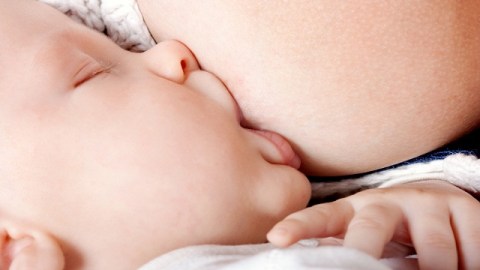“Breast” Behavior: A Q&A with Katie Hinde

Katie Hinde is the Director of the Comparative Lactation Laboratory at Harvard University. Her research examines mother’s milk and how it contributes to infant development in humans and primates–including behavior, cognition and the brain. Here, she discusses the effects of breast milk on behavior, what she thinks human mothers should know and the recent (and controversial) Time magazine breastfeeding cover.
Q: You recently found that infant monkeys who received more milk energy, either through more or fattier mother’s milk, were more comfortable being parted from their mothers and exploring a novel environment. Why do you think that is?
Katie Hinde: It was very interesting. And it would seem that if you have a Mom that makes a lot of milk, you can afford to be very behaviorally active and very exploratory. You’ve got plenty of energy to keep growing and extend on behavioral activity, and you can always go back to Mom and get more energy. When Mom is making less energy, then you have to be more behaviorally inhibited since most of the energy has to be relegated to growth and maintenance instead of behavioral activity. But what we don’t know is whether we see this difference because there are constituents in milk that are building the brain differently or the milk energy affords opportunities to gain behavioral differences that then, in turn, have the brain develop differently. Right now, it’s an open question that we hope to answer in the future.
Q: That’s the first study of its kind. Is there any related work?
Katie Hinde: In Italy, researchers looked at cortisol transfer through milk and how that affects behavioral development. And it looks like milk cortisol does a lot of the same thing that high licking and grooming mothers do to their babies. These scientists found that the infants that got higher cortisol in milk, especially males, were more exploratory, more able to adjust to novel environments and better able to down-regulate stress and do so more efficiently. But there’s one problem: high cortisol is linked to high milk energy. We need to see which of the two is responsible for this effect.
Q: This animal work is very interesting but, of course, everyone wants to know how it applies to humans. Why is it so hard to study the effects of breast milk on cognitive development in human children?
Katie Hinde: For the most part, researchers have compared formula feeding versus breast feeding and it’s a problem because it’s a self-selection kind of thing. Most women have the capacity to synthesize milk but many elect to use formula–for all kinds of different reasons. So basically, what it comes down to is that there are a lot of physiological, socioeconomic, cultural and any number of other factors that are going to influence whether a woman breast feeds or not. So attributing cognitive developmental differences to breastfeeding versus formula feeding is really tricky, because there are all these other things going on that are also going to affect an infant’s developmental trajectories.
Q: What did you think of the recent Time Magazine cover?
Katie Hinde: I thought it was unnecessarily inflammatory. I just thought it was a marketing gimmick, trying to stake a claim in the media Mommy Wars. And those Mommy Wars are just an incredible disservice to women, mothers and children and anyone who cares about these things.
Q: What is your take-home message for mothers, especially those that are considering breastfeeding?
Katie Hinde: I think mothers are very aware of how important breast feeding is for health but studies have shown time and time again that a mother’s ability to stick with breastfeeding is contingent on the amount of support she gets from her social network. So what we as a society need to do is to make sure that all the people around mothers get the same message about how important breastfeeding is. Let’s face it; every Mom is doing the best she can on any given day. And my hope is that we can remove all the challenges and barriers that make breastfeeding so difficult for Moms, so everyone can have as many best days as they can.
Image courtesy of Elena P./Shutterstock.com





